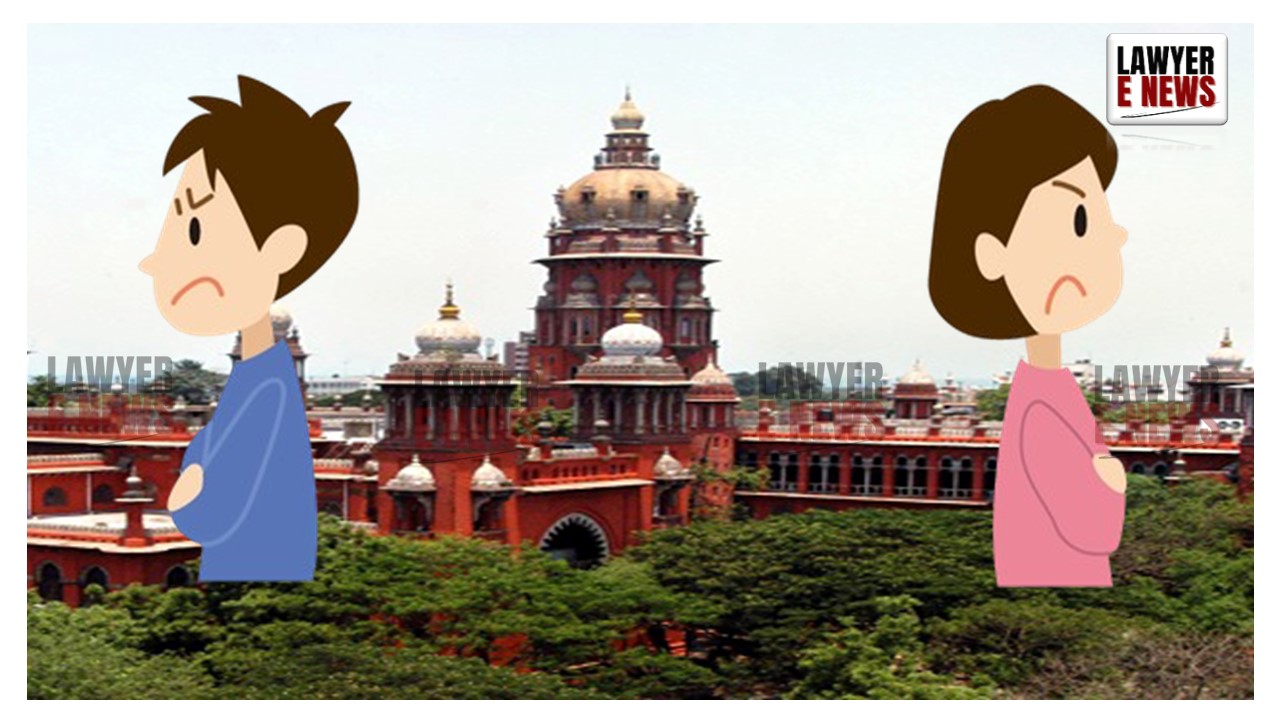-
by Admin
15 February 2026 5:35 AM



In a significant judgement, Madras High Court granted relief to three separate couples seeking divorce by mutual consent, allowing them to appear via video conferencing instead of appearing physically in court. The Court, led by Justice M. Nirmal Kumar, emphasized that modern technology, particularly virtual hearings, should be used to simplify divorce proceedings for petitioners residing abroad or facing travel constraints.
The Court also issued comprehensive guidelines for handling mutual consent divorces in Family Courts, particularly where the parties are unable to appear in person due to reasons such as visa issues or employment obligations. The Court highlighted that procedural hurdles should not delay or obstruct the dissolution of marriages when both parties have amicably agreed to separate.
"Technicalities Should Not Obstruct Justice": Madras High Court on Virtual Appearances
In all three cases, the petitioners, who were residing abroad, requested the Court’s permission to appear through virtual mode and be represented by Power of Attorneys (POAs). The Court found that the Principal Family Court, Chennai had previously insisted on personal appearances, which was unreasonable given the parties’ inability to travel to India due to employment or visa restrictions.
Justice Nirmal Kumar ruled that Family Courts should allow virtual appearances to prevent unnecessary hardship. The Court further emphasized that procedures should not stand in the way of justice, particularly when Section 13-B of the Hindu Marriage Act provides for mutual consent divorces without contest.
Madras High Court Issues Guidelines for Virtual Proceedings in Divorce Cases
In its ruling, the Madras High Court issued key directions for Family Courts to follow when handling petitions for divorce by mutual consent:
No mandatory physical appearance: Family Courts should not require the parties to be physically present for filing the petition or during future hearings.
Virtual appearances allowed: Parties can appear through video conferencing from their respective locations, especially when they are residing abroad or face other practical constraints.
Power of Attorney representation: Petitioners can appoint Power of Attorneys (close relatives, not legal practitioners) to represent them in court.
Submission of documents via POAs: The Power of Attorneys can submit all necessary documents and proof affidavits in person on behalf of the parties.
Flexible hearing schedules: Family Courts should accommodate time differences when scheduling virtual hearings, particularly for parties residing in different time zones.
No consulate appearance requirement: In civil cases, including mutual consent divorces, there is no mandatory requirement for petitioners to appear at the Indian consulate.
The Court made it clear that the presence of a coordinator at the remote site (as required in criminal cases) is not mandatory for civil cases, especially for mutual consent divorce cases.
C.R.P. No. 1994 of 2024 (G. Shrilakshmi v. Anirudh Ramkumar)
The High Court dissolved the marriage of G. Shrilakshmi and Anirudh Ramkumar, both residing in the USA, allowing them to appear virtually and appoint their parents as Power of Attorneys. The divorce was granted after the Court found that technical hurdles should not delay the process.
C.M.P. No. 12451 of 2024 in C.R.P. No. 1800 of 2024 (Aishwarya Sridhar v. Harihara Venkataraman Balasubramanian)
Aishwarya Sridhar and Harihara Venkataraman Balasubramanian, also residing in the USA, were granted a mutual consent divorce. The Court allowed their virtual appearance and representation by Power of Attorneys due to visa and employment issues.
C.R.P. No. 89 of 2024 (V. Nisha v. Ram Kumar Narayanasamy)
In this case, the High Court granted a mutual consent divorce to V. Nisha and Ram Kumar Narayanasamy, who are residing in New Zealand. The Family Court was directed to proceed without insisting on the personal presence of the parties, allowing the divorce process to be completed virtually.
Court Cites Supreme Court Rulings to Support Virtual Proceedings
The Madras High Court cited several landmark rulings, including Amardeep Singh v. Harveen Kaur, where the Supreme Court held that the six-month waiting period under Section 13-B(2) of the Hindu Marriage Act is directory and not mandatory. The Court also referred to Krishna Veni Nagam v. Harish Nagam, which approved the use of video conferencing in matrimonial cases, reducing the burden on parties unable to appear in person.
The Court emphasized that procedures are meant to facilitate justice, not create unnecessary obstacles. It criticized the Principal Family Court for insisting on physical appearances in cases where virtual proceedings could have expedited the process.
Embracing Technology for Better Access to Justice
The Madras High Court's ruling is a significant step toward modernizing the justice system by encouraging the use of technology, particularly for cases involving mutual consent divorces. The Court’s guidelines will help streamline the divorce process for couples residing abroad or facing other practical difficulties, ensuring that they can access justice without unnecessary delays.
By embracing virtual hearings and allowing Power of Attorney representation, the Court has made it easier for parties to obtain a mutual consent divorce, reducing their financial and emotional burden.
Date of Decision: October 18, 2024
G. Shrilakshmi v. Anirudh Ramkumar, C.R.P. No. 1994 of 2024
Aishwarya Sridhar v. Harihara Venkataraman Balasubramanian, C.M.P. No. 12451 of 2024 in C.R.P. No. 1800 of 2024
V. Nisha v. Ram Kumar Narayanasamy, C.R.P. No. 89 of 2024
